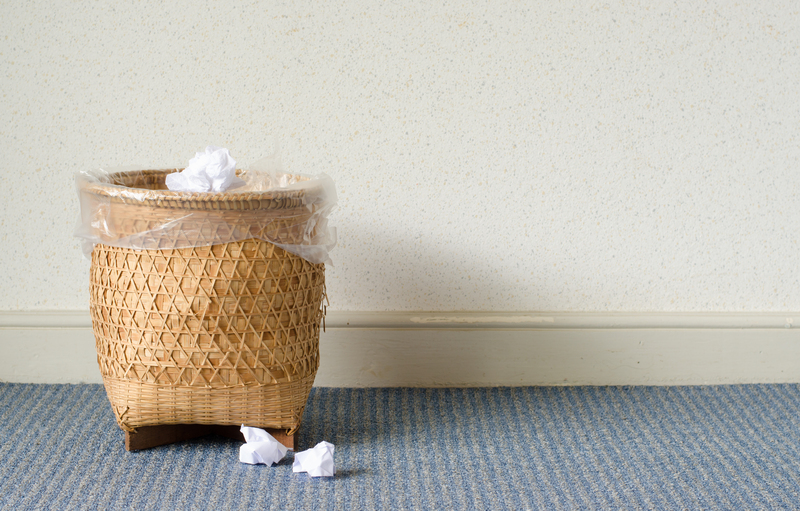How to Handle Bulky Waste Items Without High Expenses
Dealing with bulky waste items such as old furniture, appliances, or mattresses can seem overwhelming--especially when you're on a tight budget. However, there are many cost-effective and eco-friendly strategies to dispose of or recycle large unwanted items without breaking the bank. In this in-depth guide, you'll find smart, practical, and low-cost ways to handle bulky waste removal and disposal. Read on to discover easy solutions that will save you both money and effort!
What are Bulky Waste Items?
To effectively manage bulky household waste, it's important to understand what qualifies as bulky items. These are generally large objects that are too big for standard waste bins and require special handling. Common examples include:
- Old furniture (sofas, beds, wardrobes, tables, chairs)
- Large appliances (refrigerators, washing machines, stoves, dishwashers)
- Mattresses and box springs
- Carpets and rugs
- Garden waste (branches, logs, large pots)
- Electronics (TVs, computers, monitors)
- Construction debris (doors, bathtubs, sinks, windows)
The primary challenge with disposing of these items is their size, weight, and sometimes hazardous nature--making regular curbside collection insufficient. That's why finding a budget-friendly way to get rid of bulky waste is crucial.

Low-Cost Ways to Handle Bulky Waste Items
1. Donate Items in Good Condition
Donating is a win-win solution for bulky waste disposal. You're not only saving on landfill fees, but also helping your community. Many charities accept gently used furniture and appliances. Some even offer free pickup services.
- Local charities: Organizations such as the Salvation Army, Habitat for Humanity, or Goodwill often accept items in decent condition.
- Community groups: Post your items on social media groups like Facebook Marketplace, Craigslist, Freecycle, or local "Buy Nothing" communities. Often, people will collect the items themselves, saving you the hassle.
- Religious and nonprofit organizations: Churches, shelters, or youth centers may need your items.
Tip: Always check donation guidelines and schedule pickups in advance. Be honest about the item's condition to avoid misunderstandings.
2. Sell or Give Away Bulky Waste Items
If your unwanted items are still functional, you can eliminate bulky waste on a budget by selling or giving them away. Consider these approaches:
- Online marketplaces: Try platforms like eBay, Facebook Marketplace, OfferUp, or Letgo. You might make a little extra cash and have the buyer collect the item.
- Garage sale: Organize a neighborhood sale and include your bulky items at a discount.
- Curb alert: Place usable items at your curb with a clear "FREE" sign. Let neighbors know via local forums or online listings.
This method is not only free but may also reward you financially!
3. Contact Your Local Council for Bulk Waste Collection
Many municipalities offer scheduled bulky waste collection services for residents, either free of charge or at a minimal fee. Check your city or county's website for details on special collections.
- Annual or seasonal pickups: Some cities arrange bulk waste collection days a few times each year.
- On-request pickups: Book a collection slot for a small handling fee if available.
- Drop-off options: Some local recycling centers or waste facilities accept large items from residents at a reduced cost.
Pro tip: If you're part of a homeowner's association, they may also organize special bulky item pickup days.
4. DIY Disposal at Landfills or Recycling Centers
Taking large items directly to your nearest landfill or recycling center can save you on third-party collection costs. Before you go:
- Check rates and regulations: Municipal waste facilities often have lower rates for residents or even free drop-offs for certain item types.
- Sort materials: Dispose of metals, electronics, or hazardous items in designated areas to avoid fines and support recycling efforts.
- Rent a vehicle, if needed: Borrow or rent a truck only if you have multiple items, thus splitting transport costs.
Note: Always call ahead to confirm disposal hours and fees, and ask about recyclable or hazardous items.
5. Arrange for a Shared Collection or Bulk Pickup With Neighbors
Pooling resources is a great way to save money on bulky waste disposal. Talk to your neighbors:
- Group pickups: Hire a private waste collection truck and split the cost among several households.
- Community clean-up days: Organize a neighborhood event to consolidate and dispose of bulky items together.
This approach helps everyone save--and may even build local community spirit!
6. Reuse or Repurpose Large Items
Before you throw anything away, think creatively about repurposing! Upcycling saves waste-disposal fees:
- Old furniture: Refinish or reupholster sofas and chairs, or break down pieces for DIY projects.
- Appliances: Remove parts for repairs, crafts, or sell for scrap metal.
- Timber or wood: Use old drawers, doors, or planks in garden beds or art projects.
Explore online tutorials for upcycling inspiration--you might just create something valuable!
7. Hire an Affordable Waste Removal Service
If you must use a professional service, compare prices first to ensure cheap bulky item removal:
- Get multiple quotes: Contact at least three local companies for the best deal.
- Choose "man & van" providers: Smaller local businesses may have lower rates than national waste companies.
- Look for combined services: If you need to dispose of other home clutter, save by bundling removal.
Tip: Some companies offer discounts for seniors, students, or first-time customers.
Eco-Friendly and Budget-Savvy Tips for Large Waste Items
Beyond cost, handling bulk waste responsibly benefits the environment. Consider these green methods:
- Recycling: Appliances, mattresses, and metal furniture are often recyclable. Find a facility or retailer offering recycling for these items.
- Hazardous waste handling: Electronics and fridges require special disposal due to chemicals or refrigerants. Many governments run free e-waste collection programs.
- Composting: Large garden waste can be composted or chipped locally--check with garden centers or communities for free options.
- Government incentives: Watch for local grants or rebates for recycling appliances or mattresses.
What to Avoid When Disposing of Bulky Waste on a Budget
As you look for the cheapest way to get rid of large items, steer clear of these mistakes:
- Illegal dumping: Abandoning items on roadsides or vacant lots is not only harmful but often incurs heavy fines.
- Burning: Setting fire to bulky waste can cause toxic emissions and is generally illegal.
- Mixing waste: Don't mix electronic or hazardous items with general trash; this can be dangerous and costly.
- Ignoring local regulations: Always check disposal laws--some areas require permits or have limited collection schedules.
Following legal and environmentally friendly practices protects both your pocket and your community.

Frequently Asked Questions About Bulky Waste Disposal
Can I leave large items on the curb for regular trash pickup?
Usually, no. Most municipal collection does not include bulky items with standard trash. You'll need to arrange a special pickup or visit a disposal center.
Are there any items I must pay to dispose of, even if I recycle?
Yes, sometimes. Items like mattresses, electronics, or appliances with refrigerants may require a recycling fee, but this is often less than general disposal costs. Some municipalities offer free drop-off days.
What do I do with unsellable or unusable large waste?
For bulk trash items that cannot be repurposed, recycled, or donated, check for low-cost landfill or community disposal events in your area.
Can I hire a junk removal service for just one item?
Yes. Many companies offer "single-item pickup" services for items such as sofas, mattresses, or fridges, often at a reduced cost.
Conclusion - Smart, Affordable Bulky Waste Management
Handling bulky waste items without high expenses is entirely possible with some planning and creativity. By donating, selling, using municipal collections, or working with neighbors, you can remove large waste cheaply while benefiting your community and the planet. And remember, upcycling or recycling saves even more resources!
Don't let bulky waste stress or drain your wallet--take advantage of these smart disposal strategies, and keep your home and neighborhood clutter-free!
For more help, check your city's waste management website or reach out to local recycling centers for the latest affordable bulky waste disposal options.